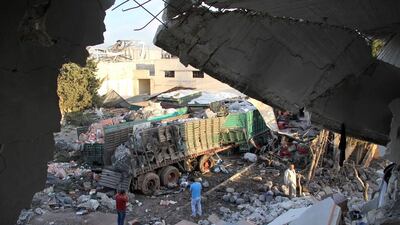New York // Syria’s opposition on Tuesday accused world powers of showing “total weakness” in the face of the Syrian regime’s renewed attacks and the collapse of a ceasefire.
Riad Hijab, head of the rebel High Negotiations Committee, also blamed Russian and Syrian planes bombed a United Nations aid convoy that was en route to Aleppo to deliver food and other basic supplies to 78,000 civilians.
At least 20 people were killed and 18 trucks from a 31-vehicle convoy destroyed on Monday evening in an attack that looked likely to deal a death blow to a week-old ceasefire.
As the UN suspended humanitarian aid convoys in response to the attack, world powers struggled to convince themselves that a ceasefire could be salvaged.
US Secretary of State John Kerry insisted that US-Russian attempts to broker a truce in the civil war are “not dead” and promised international talks will resume this week.
President Barack Obama backed his top diplomat, saying a short time later that there was “no ultimate military victory to be won” and calling on nations to pursue the “hard work” of diplomacy.
But Mr Kerry’s terse declaration, after a brief meeting in New York of the International Syria Support Group, could not conceal a pessimistic mood among his fellow foreign ministers.
Mr Kerry arrived for the ISSG meeting with his Russian opposite number and constant sparring partner foreign minister Sergei Lavrov, co-chair of the 23-nation group.
Relations between the nominal partners were already at a low ebb after a mistaken US-led coalition air strike on Saturday killed dozens of Syrian soldiers.
Then, on Monday, the negotiations appeared doomed after the Syrian army declared an end to the US-Russian brokered ceasefire.
Despite the grim mood, the ISSG members, who were gathered in New York for the United Nations General Assembly, met briefly to convene crisis talks.
The meeting proved to be inconclusive, but it allowed Mr Kerry and UN peace envoy Staffan de Mistura a chance to insist that the process has not collapsed.
Mr Kerry’s spokesman John Kirby said the ministers “agreed that, despite continued violence, there was still an imperative to pursue a nationwide cessation of hostilities based on the arrangement reached last week in Geneva between the United States and Russia.
“Quite frankly, the Kerry-Lavrov process is the only show in town and we’ve got to get that show back on the road,” Britain’s Foreign Secretary Boris Johnson said.
Officials said participants had agreed to reconvene — probably on Friday — but analysts warned that more failures would not come without political costs.
Without a ceasefire, attempts to deliver aid to starving civilians or to broker a political dialogue will fail.
“A failed ceasefire means that the other two prongs of the approach are doomed,” said Emile Hokayem from the International Institute for Strategic Studies.
US officials have demanded that Russia take responsibility for the aid convoy air strike by either Russian or allied Syrian warplanes.
The Russian defence ministry has denied any role in the attack, attempting to point the finger at rebels against Bashar Al Assad’s Syrian regime.
A short distance across Manhattan at the UN meeting, Secretary General Ban Ki-moon denounced the “sickening, savage and apparently deliberate attack”.
Meanwhile, air raids and shelling continued on front lines around Syria, where more than 300,000 have died since Mr Al Assad began efforts to suppress a popular revolt.
The Syrian Observatory for Human Rights said at least 27 barrel bombs were dropped on Aleppo on Tuesday.
Monday’s strike on the aid convoy provoked outrage from UN officials, with aid chief Stephen O’Brien warning that if deliberate, “it would amount to a war crime”.
The International Federation of Red Cross and Red Crescent Societies said Monday night’s raid destroyed at least 18 of 31 vehicles and a Red Crescent warehouse.
“Much of the aid was destroyed,” the IFRC said, stressing that “the attack deprives thousands of civilians of much-needed food and medical assistance.”
Omar Barakat, who headed the local Red Crescent branch, was wounded in the strike and later died.
The strike came just hours after the Syrian army announced the end of the truce Monday, accusing rebels of failing to “commit to a single element” of the US-Russia deal.
Aleppo residents spent the night huddled in their apartments sharing news via text messages and heard loud intermittent booms early Tuesday.
*Agence France-Presse

